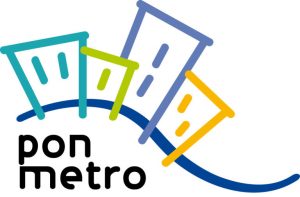National operational programme “Metropolitan cities 2014/2020”
 The Multi-fund National Operational Programme Metropolitan Cities 2014-2020(PON METRO) implements one part of the initiatives conceived in the framework of European Urban Agenda for cohesion policies, born with the aim of strengthening the role of the big cities and their territories.
The Multi-fund National Operational Programme Metropolitan Cities 2014-2020(PON METRO) implements one part of the initiatives conceived in the framework of European Urban Agenda for cohesion policies, born with the aim of strengthening the role of the big cities and their territories.
The program, dedicated to sustainable urban development, aims to improve the quality of services and to promote social inclusion in 14 metropolitan areas (Turin, Genoa, Milan, Bologna, Venice, Florence, Rome, Bari, Naples, Reggio Calabria, Cagliari, Catania, Messina and Palermo). The interventions are proposed by the same cities within an overall strategic framework and on the basis of a series of criteria defined by the National programming Authority.
The main reason implied in the activation of a national program dedicated to the 14 metropolitan cities resides in the ability to deal jointly and in a coordinated way some of the territorial and organizational challenges which affect these local contexts.
STRATEGY AND ARCHITECTURE OF THE PROGRAM
To act in response to the territorial and organizational challenges, related to the dynamics of the development taking place in the 14 metropolitan cities, and to the solicitations towards the innovation of development policies arising from the Europe 2020 objectives, the Partnership agreement has identified a number of targets and instruments for the national urban agenda.
In this context, an important role is played by the PON METRO, which is intended to quickly affect some still unresolved issues which obstruct the development in major urban areas of the Country, interpreting two driver of planning development of the three constituent the Urban national Agenda defined by the Partnership Agreement.
| PRIORITY AXES To enable the operational translation of the outlined strategic elements, the program is focused on four priority axes in addition to a fifth axis for the Technical Assistance | DRIVER URBAN AGENDA The PON METRO operates on the 14 metropolitan cities to strengthen and improve the services offered to residents and city users and is focuses on two strategic drivers |
| AXIS 1 (OT2) Digital metropolitan Agenda (FESR) |
SMART CITY for the redesign and modernization of public services through the digital agenda and a more efficient and sustainable mobility |
| AXIS 2 (OT 4) Sustainability of services and of urban mobility (ERDF) |
|
| AXIS 3 (OT9) for social inclusion services (FSE) |
SOCIAL INNOVATION for the inclusion of the most fragile population segments and areas and for disadvantaged neighbourhoods through services (FSE) and infrastructure (FESR); part of the interventions will be triggered also through an active participation of associations and citizens |
| AXIS 4 (OT9) Services for social inclusion (FESR) |
|
| AXIS 5 technical assistance (FESR) |
EXPECTED RESULTS
| Digital Agenda | – 70% of the Metropolitan City Municipalities with fully interactive services
– 50% of citizens using internet to interact with the public administration or with the public utilities managing authorities |
| Urban sustainability
|
– over 90,000 of modernized lighting systems, with a 8.8% reduction in electricity consumption for public lighting, equivalent to more than 20,000 tons of CO2 per year
– energy efficiency upgrading of at least 38,000 square meters of public buildings, equivalent to about 9 GWh / year and 400 Teq / yr. – 5% passengers increase of local public transport in the RMS (about 320 new buses) – increase in bicycle mobility by 10% in RS and by 5% in RT (approximately 150 km of new bike lanes) – approx 150 km of protected lanes for TPL (local public transport) ( (RMS) and upgrading of 40,000 square meters of interchanges (RS, RT), |
| Social inclusion
|
– creation and requalification of 2,270 apartments for families with special social and economic fragility;
– restoration of 35,600 square meters of unused buildings to be allocated to services in the third sector – integrated educational path for job, social, educational, health care placement and housing supplement for 3,904 low-income individuals and for 5,855 individuals with severe forms of distress, – integrated programs for 485 individuals belonging to the ROM, Sinti and Camminanti , communities. – low-threshold services and emergency social intervention for 1,811 homeless – support to 644 projects implemented by active actors in welfare or NGOs involved in these target areas |
BUDGET
The total budget of the program amounts to 892.9 MILLION € of which € 588.1 MLN contribution from the Structural and European Investment Funds. The program intervenes in the regions with different financial intensity, giving priority to the largest deficit and need of intervention in the less developed regions. Financial allocation for Axis
Axis |
Description (OT) |
allocation (€) |
| AXIS 1 | Metropolitan Digital Agenda (OT 2) | 151.982.830 |
| AXIS 2 | Sustainability of public services and urban mobility (OT 4) | 318.288.000 |
| AXIS 3 | Services for Social Inclusion (OT 9 – FSE) | 217.193.592 |
| AXIS 4 | Infrastructure for Social Inclusion (OT 9 – FESR) | 169.751.580 |
| AXIS 5 | Technical assistance | 35.717.332 |
| Totale | 892.933.334 | |
The financial support to PON METRO to be worth of the FESR is EUR 445,723,942.00, while the FSE resources amount to EUR 142,376,058.00. The residual budget is to be worth on the national co-financing.
METRO PON ownership is of the Agency for Territorial Cohesion which, as the Managing Authority and the Certifying Authority, is in charge of the managing and implementing the Operational Programme.
CONTACTS: Agenzia per la Coesione Territoriale Agency for Territorial Cohesion –Dirigente Ufficio 4 di STAFF – Autorità di gestione dei programmi operativi nazionali relativi alle Città Metropolitane Via Sicilia 162/d – 00187 ROMA adgponmetro14-20@agenziacoesione.gov.it

